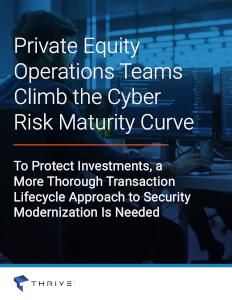Today, regulators are taking a stronger interest in understanding and assessing the resilience of alternative investment firms to cyberattacks. Finance firms are 300 times more likely to be targeted by a cyber attack. Hedge funds in particular make for enticing targets not just because they handle large amounts of money, but also because many firms have well-known principals that are highly visible in the market and easy to target. A hedge fund cyber breach would uncover sensitive investor information, intellectual property in the form of trading strategies and investment positions, and even PII of key stakeholders. Information of this magnitude can be used for further breach, sold illegally, and present extreme reputation damage of individuals and the overall business.
The vast financial services ecosystem and global interconnectedness of transactions present an extremely broad attack surface for potential exploitation. Management teams across the industry are prioritizing cybersecurity vigilance as an essential operational component of fiscal business stability.

Cybercrime is rising, and businesses must act fast—in just two years, reports of ransomware attacks have increased a whopping 3000%. Given how rapidly cyber threats evolve, your business must keep up.
Luckily, Office 365 offers several advanced threat protection features to help you monitor your data and stay ahead of cyber threats.
Overview of Office 365 Security
Office 365 is a cloud-based productivity suite. With over 345 million people using this suite, it’s a popular choice for businesses. Office 365 provides familiar tools like Word, Excel, and PowerPoint, as well as secure storage solutions like OneDrive and SharePoint. But with any online service comes the risk of security breaches, so how does Office 365 keep your data safe?
The answer is simple—Microsoft is committed to ensuring the safety of customer data, so they offer several built-in security features and a shared responsibility model between customers and Microsoft. With these tools combined, Office 365 offers a comprehensive security strategy that spans prevention, detection, and response
7 Key Security Features of Office 365
From Office 365 Advanced Threat Protection to Data Loss Prevention, here are seven key security features in Office 365 that help keep your business prepared for anything.
1. Multi-Factor Authentication (MFA)
MFA, or Multi-Factor Authentication, is a security measure that requires users to provide more than one form of authentication. For instance, alongside your username and password, you’ll be prompted to use the Authenticator app for an additional layer of protection.
Microsoft has taken this enhanced authentication process as a pivotal step to fortify security. MFA adds an extra layer of protection that significantly reduces the risk of unauthorized access.
2. Data Loss Prevention (DLP)
Data Loss Prevention (DLP) is a system that helps you monitor the way sensitive data is used and shared. It can detect when files are sent or shared with unauthorized recipients, as well as non-compliant file types like .exe files. You can customize DLP policies to protect specific data sets and user groups, so you always know who has access to sensitive data.
3. Threat Protection with Office 365 Advanced Threat Protection (ATP)
Office 365 Advanced Threat Protection (ATP) provides comprehensive protection against email and file-based threats, like malware, ransomware, and zero-day attacks. It also offers two additional features—Safe Attachments and Safe Links—which scan emails and links for malicious content before they reach your inbox.
4. Information Rights Management (IRM)
Information Rights Management (IRM) in Office 365 allows you to control and protect documents and emails by defining access permissions. This includes setting limitations on copying, printing, and forwarding your sensitive information. To implement IRM in Office 365, navigate to the Security & Compliance Center, then to the Information Protection section.
From here, you can create and manage IRM policies for your Office 365 environment. Remember to apply these policies to the right groups and users to secure your sensitive data effectively.
5. Security and Compliance Center
The Security and Compliance Center within Office 365 acts as a unified interface where you can manage and monitor your data. Its centralized structure ensures that security and compliance are not scattered across various modules, but are instead managed collectively from one place.
6. Data Encryption and Secure Collaboration
Data Encryption helps protect your files by encoding them with a secure key. This makes it much harder for hackers to access sensitive data and ensures that only authorized users can view the encrypted files.
Office 365 also offers secure collaboration features, like allowing employees to securely share documents across different teams and locations. These features help ensure that your company’s confidential data stays secure throughout its entire lifespan.
7. Mobile Device Management (MDM)
Mobile Device Management (MDM) in Office 365 provides the capability to manage both company-owned and personal devices. It includes access and security controls to protect your organization’s information from potential threats.
MDM also allows you to create device security policies, manage device access settings and remotely wipe a device if it’s lost or stolen. Plus, you’ll get conditional access control, which means that access to Office 365 can be blocked or limited based on conditions such as location, device compliance, or risk.
Leverage Office 365 Threat Protection with Thrive
Contact us today to learn more about how Thrive can help you manage Office 365 securely! Our experienced team of security experts will work with you to create a comprehensive security strategy tailored to your unique needs.
The Partner That Knows: Private EquityA cyber attack disrupts normal business operations and can cause longer-term damage to important IT assets and infrastructure that can be impossible to recover from without the budget or resources to do so. According to Ponemon Institute’s State of Cybersecurity Report, small to medium-sized businesses around the globe report recent, worrisome experiences with cyber attacks:
- Insufficient security measures: 45% say that their processes are ineffective at mitigating attacks.
- Frequency of attacks: 66% have experienced a cyber attack in the past 12 months.
- Background of attacks: 69% say that cyber attacks are becoming more targeted.
DOWNLOAD our eBook today!

Private Equity (PE) is unique within the world of financial services. Unlike most investment firms, private equity players like to roll up their sleeves and take a more active role in managing and shaping the companies they invest in. With a cadre of vertical industry experts and in-house business transformation special ops teams, PEs like to focus their investment strategy on private companies with a longer, multi-year investment horizon and establish close working relationships with their portfolio company management teams. Value creation is the goal, and PE firms accomplish that through operational improvements, strategic initiatives, cost reductions, and market expansion.
DOWNLOAD our white paper today!

CHALLENGE
A company specializing in international transportation solutions, customs, warehousing and distribution was experiencing repeated technology and Wifi issues. Their current MSP was unresponsive, had continuous data backup failures, and failed to remediate persistent wireless access issues. In addition, there was no proactive strategic planning in place for the company’s aging infrastructure.
SOLUTION
The logistics organization was searching for a technology partner and was impressed with Thrive’s reputation and deep bench of talented IT professionals. Once the current MSP learned another vendor was being vetted, it cut the company off from all technology and support. Thrive jumped right in to maintain business continuity and begin improvements on the antiquated IT infrastructure. Thrive experts deployed the Thrive Cybersecurity bundle, Managed EBMS Firewalls, Managed Backups and 24×7 server and technical account support.
RESULT
As a result of Thrive’s fully-managed Cybersecurity, firewall and backup solutions, the logistics company has already experienced a huge reduction in lagging response times. The Thrive team was able to take a deep dive and identified risks and issues that created a lot of downtime for the logistics organization. Thrive is moving forward with a plan to upgrade the company’s infrastructure and replace the WiFi in its warehouses that will further improve the workflow and speed up delivery and receiving times.
How can Thrive help your business?
Thrive is a leading provider of outsourced IT Infrastructure designed to drive business outcomes by helping you get the most out of your IT.
To learn more about our services, CONTACT US
Employee Spotlight: Emily Craft, Associate EngineerWelcome back to another installment of our “Thrive Spotlight” blog series.
Our featured employee is Emily Craft, an Associate Engineer at Thrive. Emily coordinates clients’ incidents and service requests within Thrive’s Remote Service Center.
After beginning her career in the educational industry, Emily parlayed her degree in Art History and Criticism into her current role of critically analyzing client needs, dispatching requests for onsite resources, and the potential for future client schedule coordination.
Emily lives in Long Beach, New York, and enjoys running near the beach, traveling with her fiancé, reading and painting.
Hi Emily! Can you tell us about your background and how you came to Thrive?
I spent the first ten years of my career in education before leaping into the technology industry in early 2022. One of my first steps in the transition was to become CompTIA A+ certified through the Computing Technology Industry Association. This certification led me to join Thrive in October of that same year.
Where did you go to school or get training?
I earned my bachelor’s degree in Art History and Criticism and Studio Art at Stony Brook University. Later, I acquired several technology-related certifications, such as CompTIA A+, Mimecast Warrior and ITIL 4. I’m currently studying for the CompTIA Security+ certification and the AZ-900.
What do you most enjoy about working for Thrive?
I enjoy quite a few things about working for Thrive. I enjoy all the challenges I face daily, which keeps things interesting. I also appreciate the team members I work with. They’re a great group, and I’m lucky to be a part of it. Lastly, I love that Thrive fosters its employees and helps them along their career paths.
Are you interested in learning more about Thrive? Click here!
And don’t forget to follow us on Twitter and LinkedIn for the latest news and continue checking our blog for more in our “Thrive Employee Spotlight” series. Until next time…
Thrive Expands into Texas with IT FreedomThe acquisition of the Austin-based Managed Service Provider deepens Thrive’s Southwest presence
FOXBOROUGH, Mass. – July 12, 2023 – Thrive, a premier provider of Cybersecurity, Cloud and Digital Transformation Managed Services, announced today the acquisition of IT Freedom, a technology managed services provider based in Austin, Texas. The acquisition extends Thrive’s NextGen Managed Security & Services Platform into Texas and will enable IT Freedom’s clients to securely accelerate their Digital Transformation journey to the Cloud.
“IT Freedom is a customer-first technology services company with a stellar track record of providing a white glove experience to clients of all sizes in Austin for over two decades,” said Rob Stephenson, CEO of Thrive. “We’re excited to partner with the IT Freedom team to service their clients and anchor Thrive’s expansion plans throughout the state of Texas.”
As a Texas MSP pioneer, IT Freedom has provided managed IT, security, network, and cloud services and support since 1999.
“IT Freedom is proud to have delivered outstanding service to the Austin market for more than 20 years with state-of-the-art technology and unrivaled customer service,” said Carey Jung, IT Freedom Founder and President. “Our company culture and rapid growth align perfectly with Thrive as it continues to expand its NextGen Cybersecurity & Cloud portfolio in Austin and beyond.”
IT Freedom is Thrive’s 19th acquisition since 2016, further accelerating Thrive’s global footprint and position as a leading end-to-end managed services technology provider.
For more information on Thrive, visit thrivenextgen.com.
###
About Thrive
Thrive is a leading provider of NextGen managed Cybersecurity & Cloud-based services designed to drive business outcomes through application enablement and optimization. The company’s Thrive5 Methodology utilizes a unique combination of its Application Performance Automation Platform and strategic services to ensure each business application achieves peak performance, scale, uptime, and the highest level of security. For more information, visit thrivenextgen.com.
Thrive: LinkedIn, Twitter, Facebook, YouTube and Instagram
MEDIA CONTACT:
Stephanie Farrell
Thrive
VP of Marketing
617-952-0289
Selling into the Financial Services Vertical – Partner Win with 3 Tree Tech Before the Deal: Private Equity Firms Now Requiring Cybersecurity Controls at Portfolio CompaniesPrivate equity (PE) firms have no choice but to adapt as digital transformation continues to accelerate across all industries, and with it, elevated cybersecurity risk across their portfolio that has become a key due diligence focus area before investments are made.
Baseline requirements for PE investment are strict for a reason, and undervalued companies work tirelessly to demonstrate their growth potential and vision in order to find the right funding partner to help grow their business. Now, in addition to requirements like financial health and management structure, savvy PE firms are prioritizing minimum standards for cybersecurity in order to protect their potential investments.
The increased attention on cybersecurity inspection, often before a deal is even signed, is the new normal. Cybersecurity crime and breach statistics are off the charts and demonstrate just how significantly cybersecurity has evolved as a risk factor for business operations and long-term business viability.
According to a report by Cybersecurity Ventures, the global cost of cybercrime is expected to reach $10.5 trillion annually by 2025, up from $3 trillion in 2015. And a 2020 study by IBM found that the average cost of a data breach is $3.86 million, up 10% from the previous year. In response to these staggering numbers, insurers, for instance, often require applicants to demonstrate that they have cybersecurity measures in place before they grant coverage, while regulators are applying pressure at historically high levels.
Prospective PE Portfolio Companies Face Unique Risk Vulnerabilities
Once a company has agreed to be acquired by a private equity firm, it may become a more attractive target for cyber attacks. There are several reasons why:
- Any funding announcement draws attention and the threat actor’s perceived value of the company in receipt of investment increases due to its association with the private equity firm. This has the potential to draw the attention of cybercriminals who may see the private equity firm’s involvement as a sign that the company has valuable assets or data that can be exploited for financial gain.
- The acquisition process itself can make the company more vulnerable to cyber attacks, as due diligence requires a massive amount of data sharing including sensitive financial, legal, and operational information with the private equity firm and its advisors.
- During the integration process, the portfolio company is often exposed to new systems, networks, and technologies that can introduce additional cybersecurity risks. Integrating IT systems and data across different organizations can open up security gaps that are easily exploited by cybercriminals.
To minimize these risks, private equity firms should conduct thorough due diligence on the cybersecurity posture of the portfolio company before the acquisition, and implement appropriate cybersecurity measures and protocols during the integration process. This may include conducting regular vulnerability assessments and penetration testing, implementing strong access controls and data encryption, and providing cybersecurity awareness training to employees.
A mature cybersecurity program is no longer just the priority of large, well-resourced companies. From startups to mid-market, firms are now finding that a host of third parties including clients, insurance providers, regulators and investors, are now requiring them to implement sustainable cybersecurity defenses.
The PE firm/portfolio company relationship is a symbiotic one by nature: value sees value. The only way to ensure mutual success in today’s always-on and interconnected world is to secure the value both parties offer. Value creation is hard to achieve without value protection. Thrive’s NextGen managed services for private equity firms can optimize, manage and protect critical infrastructure in real time, at all times.
Ramp Up Cybersecurity with Thrive
To help portfolio companies get started on the path to cyber risk mitigation, Thrive can design and implement a strong security foundation to ensure the right actions and choices are being made to protect the organization and achieve compliance.
